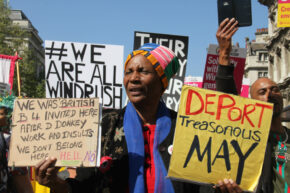
British-French narratives to restrict immigration from the Global South, 1960s-mid-1980s
This Working Paper identifies five prominent transnational narratives in France and the UK that aimed to justify restrictions towards immigrants from the Global South, from the 1960s to the mid-1980s, when both countries turned to restrictive policies structurally. France and the UK were the most exposed to large and autonomous migration flows from the Global South as a result of their former colonial empires. Parliamentary debates in the House of Commons and the French Senate, articles from British, French, and American newspapers, including a local French newspaper, and public speeches allow reporting an invasion narrative, a difference narrative, a humanitarian narrative, an oil-shock narrative, and a crisis narrative. The humanitarian narrative – presenting migrants as victims to protect – and the crisis narrative – putting forward insurmountable economic difficulties to curb immigration – became the most successful to justify state intervention to restrict immigration as they matched native workers’ concerns while minimising disturbances within destination countries.







